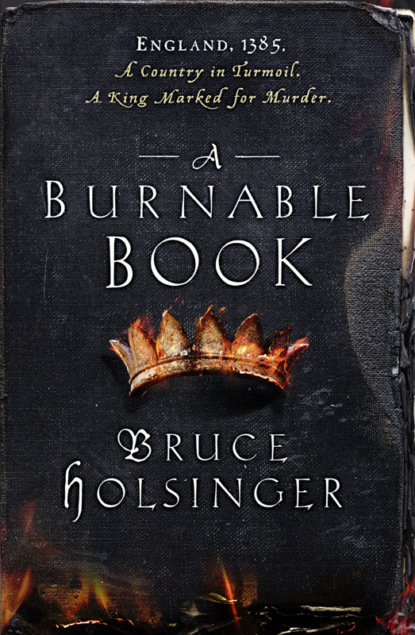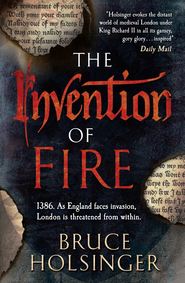По всем вопросам обращайтесь на: info@litportal.ru
(©) 2003-2024.
✖
A Burnable Book
Автор
Год написания книги
2019
Настройки чтения
Размер шрифта
Высота строк
Поля
‘Why there you are.’
Millicent tilted her forehead against the door, sighed, then put on her best smile as she turned. Denise Haveryng, proprietress of her own late husband’s thriving shop and a boastful freewoman of the city, wandered over with a tray of flans. ‘Dame Haveryng.’
‘You’ve been to Lawler’s, I see.’ She inspected the opened package in Millicent’s hands, clearly disapproving of the indulgence. The weeds on this widow were dark only in colour: gauze sleeves flounced at her wrists, a belted sash with a leather buckle that almost glistened at her waist, and the damask lappet on her brow beneath a short-coned hat would not have looked out of place on an earl’s wife.
Millicent, though not hungry, reached for a flancake.
‘You’ve had visitors,’ Dame Haveryng began. ‘Three of them.’
‘Ah?’ Millicent opened her door. Denise herded her inside.
‘Been like the Whitsunday procession. First there was Master Pratt, third time this month.’
The house’s owner, clerk to the merchant taylors’ guild, after her for weeks over the lease.
‘Very well.’ Millicent removed her hood, once a subtle latticed affair trimmed in silk, now fading and patched.
‘And Jacob. To see about back wages, the poor dear.’
Millicent winced at the reminder. Even her former servants were her creditors now. ‘And the third?’
‘Your sister.’
Millicent froze.
‘Takes after you, though dresses a bit downward from your station.’ Denise paused in her glee. ‘Wasn’t aware you had a sister, dear.’
‘We – we are not close.’ Their last meeting, nearly two years before, had been a chance encounter on the wharfage, Agnes waiting to board a common wherry, Millicent and Sir Humphrey passing by to hire a private barge. They had exchanged quick smiles; Millicent remembered Agnes’s hand jumping from her side, though she had settled for a furtive nod before turning away.
Ignoring the flan tray, Millicent pushed Denise from her house and shut the door. Out back she took the stairs two at a time. The door to the rear bedchamber was ajar. She entered to see her sister huddled against the wall, clutching a bolster, wrapped in a coverlet.
‘What are you doing in my house, Agnes?’
Her sister looked dreadful, her skin ashen, her hair a tangled mess. Her eyes would not meet Millicent’s until she had walked over to the bed and sat, the old straw pallet giving beneath her weight. Agnes looked up at her sister, her eyes darkened with sleeplessness and, Millicent thought, fear. ‘I’d nowhere else to go, Mil.’
‘Not to our mother’s?’
‘Said I’d made my choice, now I’m on my own, like I wanted it.’
‘Why do you need anyone’s help?’
‘“Though faun escape the falcon’s claws and crochet cut its snare, when father, son, and ghost we sing, of city’s blade beware.”’
‘Are you sick, Ag? You’re talking no sense.’
‘She gave it me before she died. That’s what she yelled.’
‘Our mother has died?’
‘“Doovay leebro”, he said to her. “Doovay leebro”, like he was singing.’
‘Who was singing? Is our mother dead, Agnes?’
She shook her head. ‘Not Bess Waller. That poor girl by the fire. Man with the hammer killed her.’
‘Man? What man?’
Over the next while, as Millicent sat with her sister and calmed her down, Agnes haltingly told her all that had happened: her assignation in the Moorfields with the abbot of Bethlem, the holy man’s departure after a short swyve, the silence as she dressed, then the crash of shrubbery before the beautiful girl burst into the small circle of firelight. ‘She tried to talk, to tell me something, I could see it, but the poor thing was out a’ breath, and the man was just behind her. So she shoved me her bundle and pushed me into the hawthorn and put a finger over her lips. Then he was there.’ Finally the girl’s death: the exchange of words in two tongues, the fall of the hammer, the killer’s silent departure from the clearing.
Millicent listened with a growing disbelief, torn between sympathy for Agnes’s plight and fury at her sister for bringing this darkness into her home. When Agnes had finished she stood and staggered over to a large chest, one of the last household items Millicent had to sell. She reached down behind it and withdrew a rectangular object wrapped in a heavily embroidered cloth. She looked down at the bundle for a long moment, then handed it to Millicent.
‘I suspect he’ll be wanting it back.’
FIVE (#ulink_60109504-f0d9-5261-8417-018a77de9393)
St Laurence Lane, Ward of Cheap
Joan Rugg slapped the constable’s wrist. ‘Not so pinchy there!’ she cackled. The constable gave the bawd a hard shake as he led her toward the beadle’s shop, where two men bearing heavy sticks stood to the sides of the door. Joan goosed them in the ribs. ‘Valued jakes of the ward, these ones,’ she teased. ‘My best regulars.’ The men traded denials.
Eleanor Rykener entered the shop behind them, a heady mix of ash and smelt in the air. An image of St Dunstan hung over the door out to the smithy in back, while wooden shelves at various heights displayed the goldsmith’s newest wares. Gleaming plate, necklaces with inlaid gemstones, silver spoons laid out on silk. On the facing side were objects brought in for repair: a bishop’s crozier, a set of clasps, embossed cabinet panels, a rich man’s wine jug. That jug alone would buy my cock and arse for a year, Eleanor mused. Joan, she could see, was having similar thoughts about the rings.
Two apprentices tooled a brace of gold plates. For a while, as the constables shuffled their feet, the maudlyns sat and listened to the tap tap tap, the rough joining of common tools and precious metal, until the guildsman came in from the back. Eleanor looked up and into the nose of Richard Bickle, beadle of Cheap Ward and richest goldsmith north of Cheapside. The eyes and ears of the ward, a man who knew everything about anyone worth knowing anything about. Past master of the city’s guild, Bickle was wrapped in a gown of red wool trimmed in sable, his lean face atop a neck chafed by a recent shave. ‘Ladies.’
‘Master Bickle,’ said Joan.
‘Let’s cut through the elegances.’ Bickle’s voice was clipped, severe. He rubbed his palms. ‘Two of your unspotted virgins been seen, Joan, heading into the Moorfields, coming out all spooked. Now we got a dead lady found not a hundred yards from where they come out the moor.’
Eleanor toed at a gap in the rushes.
‘Hope you’ll see it as we do, Joan. Girl’s killed in one ward, possible witnesses whoring it up in another. City politics be a tricky business.’ He spread a paternal smile. ‘But no need to take this to the Guildhall, yeah? Avoid complications. Wouldn’t want to shut down Gropecunt Lane again, send you and the Blessed Sisters of St Pox down Southwark way for trimming your hoods in budge.’
‘Course not,’ said Joan, wagging her head. ‘Who’s the dead girl?’
Bickle shrugged. ‘Not for the likes of us to know. Some intimate connection to mustard, is all I’m told.’
‘French girl then?’
‘Looks like to the coroner,’ said Bickle. ‘Some fancy lady taken to the Moorfields, brained in the prime of life, left for the crows. Sad story, but not ours.’
‘Right right.’ Joan fingered her chin. ‘And why they pulling your poor knob into this mess, Master Bickle?’
‘Pressure from above and beside: the alderman, getting it from the mayor, getting it from the bishop, getting it from the – ah, St Tom only knows. I do as I’m told.’
Joan turned to Eleanor. ‘What about it, El? Tell the little man what he needs to know.’
Bickle bristled at little man, but held his peace. He turned to Eleanor. ‘Good then. Firstwise, what were you doing out on the Moorfields that time of day? Bell of five, was it?’
‘Thereabouts,’ said Eleanor, in no hurry to help.






